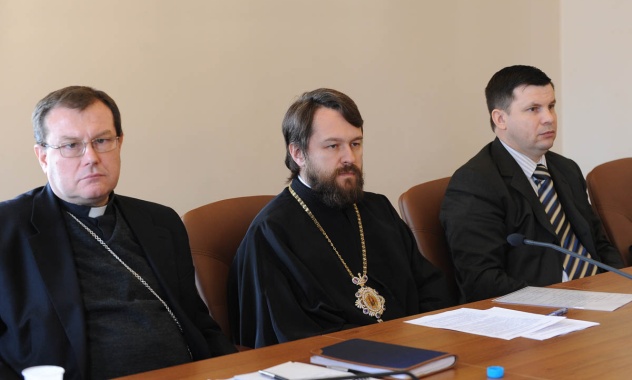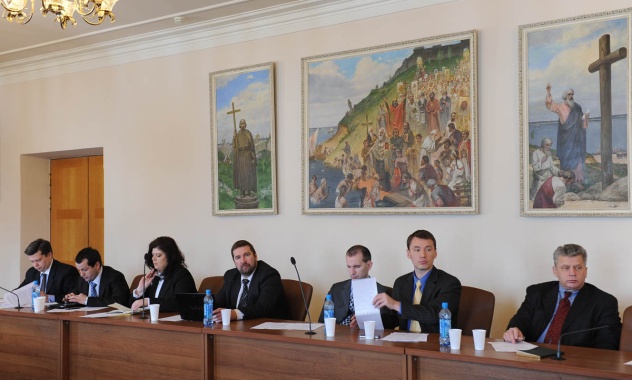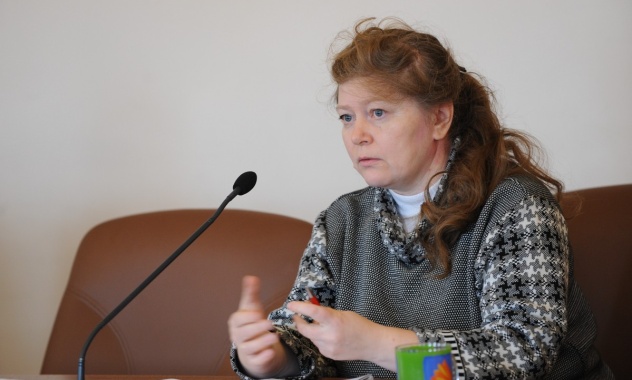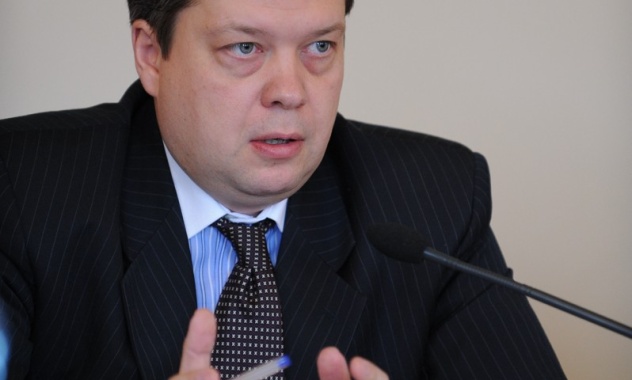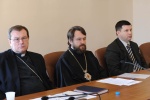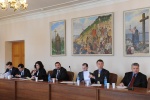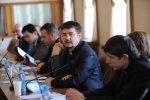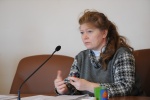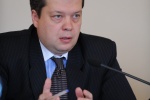CIS and Baltic Christian Inter-confessional Committee supports initiatives by Patriarch Kirill for improving national population policy
The CIS and Baltic Christian Inter-confessional Committee (CIAC) held a working meeting on March 4, 2011, at the Moscow Patriarchate’s department for external church relations, to discuss cooperation between religious and public organizations in the population policy.
The meeting was attended by Metropolitan Hilarion of Volokolamsk, head of the Moscow Patriarchate’s department for external church relations; Archbishop Paolo Pezzi, head of the Roman Catholic Archdiocese of the Mother of God in Moscow, Mr. V. Vlasenko, chairman for external relations of the Union of the Evangelical Christians-Baptists in Russia – co-chairman of the CIAC, as well as committee members from the Armenian Apostolic Church, Evangelical Lutheran Church, Union of the Evangelical Faith Christians in Russia, Church of the Christians of the Evangelical Faith in Russia, the Seventh-Day Adventists, and representatives of public organizations.
The participants discussed the population situation in the post-Soviet space and dealt with the problem of abortion and public policy with regard to the family as well as the need to assert Christian ethical values in society.
Archpriest Maxim Obukhov, head of the Orthodox medical and educational center ‘Life’, pointed to the importance of the recent proposal by His Holiness Patriarch Kirill of Moscow and All Russia to improve the Russian policy with regard to the care of family and childhood. Noting the great number of abortions in today’s Russia, he stressed that a decrease in their number could be achieved mostly through the missionary work of parishes and broad charitable work.
Rev. Dariusz Peljak, director of the Family Center at the Archdiocese of the Moscow of God in Moscow, and Rev. Andrew Babulev of the Evangelical Lutheran Church shared the experience of opposing the spread of abortion in other countries.
Metropolitan Hilarion, in his address, informed the participants about the conference held on the same day between leaders of the Synodal Department for Charity and Social Service and the Synodal Department for Cooperation with the Armed Forces and the rector of St. Tikhon’s Orthodox Humanitarian University.
He emphasized that it was only by ‘all the community’ that the population problem could be resolved. He identified the four factors which could together bring about a radical change in today’s catastrophic situation:
- Public policy for the support of family, motherhood and childhood;
- The work of Christian Churches and non-Christian traditional religions in Russia in this field and their efforts to raise public awareness of the value of family;
- Common efforts of the mass media to support family values, motherhood and marital fidelity and to discourage abortions;
- Propaganda of a healthy way of life through primary, secondary and higher education, that is, among children and youth, and creation of an image of the mother of many children and large family that can be attractive for the younger generation.
Addressing the theme of public policy with regard to the family, His Eminence Hilarion stated that primary impulses and signals should come from above, from the President and the Chairman of the Government and leaders of the legislative bodies. He noted that much had already been done in this respect and the demographic trend was gradually changing, but too slowly. ‘Radical changes in population policy are needed’, he insisted.
The DECR chairman also posed the question of the need to educate medical doctors and students for family ethics, bioethics and medical problems involved in the life of the embryo in the mother’s womb and the life of the already born child and to educate them for problems involved in the family upbringing.
‘The medical community should be charged with the clear task to set as a priority the preservation of child’s life’, he emphasized, noting that the quality of doctors’ work should be judged by the number of lives they managed to preserve, not to destroy’.
Speaking about other aspects of the population policy, he reminded the meeting of the importance of uninterrupted work of the adoption system, saying, ‘We know that among problems facing our society is the abandonment of children by their parents. But the difficulties involved in adoption present a no lesser problem. This process is extremely bureaucratized. On their way to adoption, healthy parents have to overcome many obstacles, and the difficulties experienced by potential adopters are often created by the unscrupulousness of functionaries involved’.
Measures for increasing the birth rate should be taken throughout the country, but they have a special importance in the so-called depressed regions, the metropolitan said. He proposed – after the pattern of the experiment conducted for teaching the basic of religious culture in some regions – to select the regions with the most glaring demographical statistics and to initiate in them a program for increasing the birth rate and for supporting large families.
Metropolitan Hilarion also shared his thoughts about the steps which can be made by Christian Churches and other traditional religions to help solve the population problem. ‘Our principal tool is preaching. Each of our confessions preaches in a different way but as far as moral values are concerned, our positions are very similar. There are no essential differences between the Christian confessions and traditional religions in our country as to the family ethics. Therefore, we have a vast space for cooperation and can consider together a strategy of educational work for the support of the family’, the hierarch said, stressing that the topic of family values should be one of the focuses in preaching. ‘Every parish, every religious community can become not only a place where people meet God and participate in sacraments but also a place where they find out what a full-fledged family is’, he said.
Addressing the third of the factors he had identified, namely, the work of the mass media, Metropolitan Hilarion stated the absence of any strategy for the support of the family and propaganda a healthy work of life on the central Federal TV channels. On the contrary, too much time is allocated to both direct and indirect propaganda of sexual laxity, violence, debauchery and other vices which radically contradict the Christian family ethics. ‘Regrettably, today our television has no regular program which would tell what family is, why child bearing is needed, how children should be raised, how husband and wife should behave towards each other, why sexual relations before and outside marriage are dangerous, what consequences can be brought by abortion and contraception’, he said.
He disagreed with the opinion that television only reflects the life of society without influencing it, saying, ‘Actually, the mass media in our time, especially television and the Internet have a great influence because they not only reflect reality but also form it. It is my deep conviction that the reality formed by our mass media should lead not to the extinction of our nation but to a gradual change for the better in the population situation’.
The DECR chairman also shared his thoughts about the role of education system in normalizing the population situation. He drew the attention of the meeting to the fact that today the system of primary, secondary and higher education is used to instil in children and youth the idea that a successful person is one who has made a career and created for oneself and around oneself a situation of maximal material welfare. Thus, the family values stand far from the fore in the lessons taught to schoolchildren and students.
In this connection, Metropolitan Hilarion said it was extremely important to extend the experiment for teaching the basics of religious culture in secular schools. ‘The basic religious culture is not only the history of churches or religious traditions. It is also the ethics they preach. I believe a considerable part of the course could be given to a discourse on ethical values, especially the religious understanding of family’, he said.
He also pointed to the importance of a further spread of theology as a discipline to be taught in higher education institutions and establishment of chairs of theology in secular educational institutions. ‘As a rule, the higher education institutions which have established such a chair open churches with a permanent priest. In some cases the presence of a pastor plays an essential role in the life of a university. In fact, a chair of theology becomes not only a source of knowledge but also a breeding ground of morality so necessary to higher education institutions’, he said.
In conclusion of his address, Metropolitan Hilarion proposed to consider an important document on the agenda topic – Proposals for Improving the Federal Policy for the Care of Family and Children, which has recently been offered by His Holiness Patriarch Kirill of Moscow and All Russia.
After the discussion, the meeting adopted a final document.
DECR Communication Service







